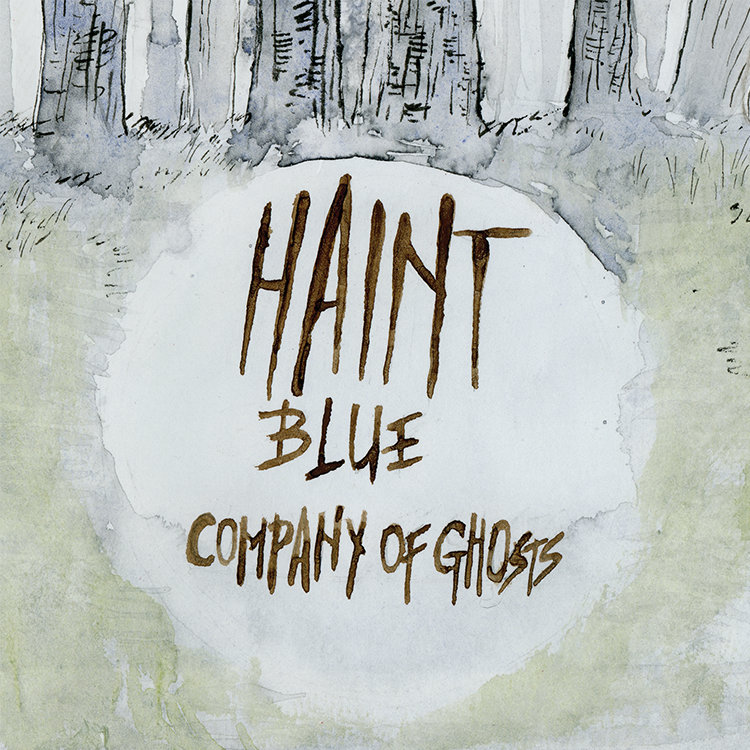Haint Blue, an indie-bluegrass band whom I've had the pleasure of seeing live twice here in Baltimore, released their first EP, Company of Ghosts, this past April. (I am quick on the uptake with reviews.) Company of Ghosts can be found on their Bandcamp site, and the band is also on Facebook.
If you happen read this within a couple hours of its posting, you might be able to see them at Normal's Books and Records at 8 tonight -- I won't be there, due to a head cold, but seriously, it's five bucks and it's a good concert. If not, they're slated to play at 123 Pleasant Street in Morgantown, West Virginia on the 19th of next month, and they'll be back at the Ottobar here in Baltimore the day after New Year's.
The Strong Points
Indie folk, or whatever you want to call it, has had a real flowering over the last several years -- Mumford and Sons are probably the most mainstream example, but there's quite a variety to choose from: the brightness and energy of Beirut, the genre-defying experimentalism of Sufjan Stevens, the haunting softness of Bon Iver, or the simple, raw sound of Youngest Son, whom I reviewed earlier this year.
In this spectrum, Company of Ghosts has a sound of its own. Its debt to traditional folk music is plain, but Haint Blue can't quite be classified simply as a folk band, not least because, lyrically, they have truly struck out into new territory. The chronicling of the lyricist's loss of faith is a remarkable work of poetry -- unvarnished in its apostasy, yet with a sensitivity and a beautiful melancholy over the intra-familial costs that makes it plain this is no mere adolescent revolt. The weaving of Scriptural language into the songs, particularly the first two tracks (the latter of which, "Father Abraham," makes a magnificent use of the story of the sacrifice of Isaac, reminiscent of Wilfred Owen's poem The Parable of the Old Man and the Young), gives them a peculiar power, reminiscent of the gloomier spirituals like "O Death," and of XTC's "Dear God." The simple sound of the lyrics belies their force -- such as that displayed in this verse from the untitled opening song:
In my city, on a bench, a madman makes his sad bed
He speaks to you, Lord, but he don't see
The empty cold on your wings as you bring him to his reckoning
The album ranges over other themes as well: anti-authoritarian and anti-capitalist, or at the least anti-corporate, themes emerge, suggesting the ideas of some of the early anarchists like Emma Goldman. Relationships under damaging strain, particularly the strain caused by coming-of-age and by departure from the home's Christianity, are depicted in several songs, with phrases and images whose simplicity and directness really bring them home to the listener.
Over it all, bringing it all together, are the earthy voice of Mike Cohn and the elegant, homey violin stylings of ... I think it's Abby Becker, but I don't know for sure which name goes to which face because I am very bad at that kind of thing. The point is, it sounds amazing and you should buy their stuff and love them.
The Weak Points
I can say delightedly that I'm not sure there are any.
Is It Worth Buying?
Is it worth not buying? Seriously, it's a great album and it's only seven bucks. Listen and enjoy.
Haint Blue are: Dave Sheir (upper right), Mike Wolfe, Abby Becker, Nellie Sorenson,
Mike Cohn (dead center), Ian Finch, and Alex White. Dave and Mike Cohn are the
only ones I know personally, so I'm not sure how the other names and faces match up.
(I am sorry if I wasn't supposed to use your photos guys please do not murder me in the face)


Thanks for the recommendation Gabriel, checking it out now.
ReplyDeleteAs a fellow music snob-geek, I am curious, what are some of your all-time favorite records?
Ah, don't make me choose! But you have done, so I will anyway. I'm fairly omnivorous, genre-wise. My favorites include, but are not limited to:
ReplyDelete- Wish You Were Here by Pink Floyd (which in my opinion deserves the reputation that Dark Side of the Moon has in fact)
- Origin of Symmetry by Muse
- Deloused In the Comatorium by The Mars Volta (arguably the finest single album of its decade)
- ARTPOP by Lady Gaga (which I feel was very underrated)
- The Mask and Mirror by Loreena McKennitt (a fascinating blend of Celtic, Indian, and Arabic elements)
- The Age of Adz by Sufjan Stevens (a masterpiece of indie-electronica-experimental music)
- Ceremonials by Florence + the Machine
- Achtung Baby by U2
- Nude by The Irrepressibles (a fascinating blend of pop and operatic-classical elements)
- Live at Stubbs by Matisyahu
Achtung Baby is my all-time favorite. Glad to hear we share that!
ReplyDeleteI'm more of a Seven Swans/Michigan guy when it comes to Sufjan, but I'll take it.
I feel that pretty much everything Sufjan Stevens touches turns to gold, honestly. I was surprised by how much I liked his Christmas albums (usually I find such things gimmicky and lame). I definitely agree with your high estimate of Seven Swans, but The Age of Adz defies description for me. I'd probably have put more of his albums on the list -- and more of Muse's work, too, and some other artists like Depeche Mode -- but I felt it was getting rather long already.
Delete